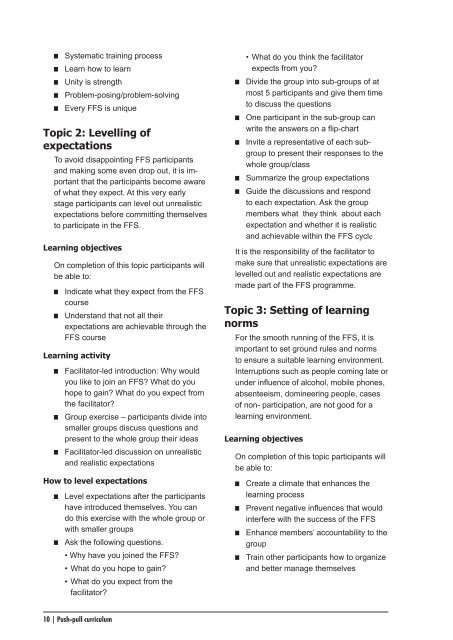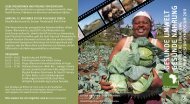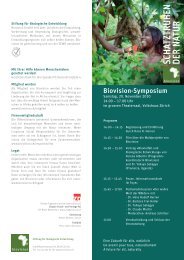Curriculum (PDF) - Biovision
Curriculum (PDF) - Biovision
Curriculum (PDF) - Biovision
You also want an ePaper? Increase the reach of your titles
YUMPU automatically turns print PDFs into web optimized ePapers that Google loves.
Systematic training process<br />
Learn how to learn<br />
Unity is strength<br />
Problem-posing/problem-solving<br />
Every FFS is unique<br />
Topic 2: Levelling of<br />
expectations<br />
To avoid disappointing FFS participants<br />
and making some even drop out, it is important<br />
that the participants become aware<br />
of what they expect. At this very early<br />
stage participants can level out unrealistic<br />
expectations before committing themselves<br />
to participate in the FFS.<br />
Learning objectives<br />
On completion of this topic participants will<br />
be able to:<br />
Indicate what they expect from the FFS<br />
course<br />
Understand that not all their<br />
expectations are achievable through the<br />
FFS course<br />
Learning activity<br />
Facilitator-led introduction: Why would<br />
you like to join an FFS? What do you<br />
hope to gain? What do you expect from<br />
the facilitator?<br />
Group exercise – participants divide into<br />
smaller groups discuss questions and<br />
present to the whole group their ideas<br />
Facilitator-led discussion on unrealistic<br />
and realistic expectations<br />
How to level expectations<br />
Level expectations after the participants<br />
have introduced themselves. You can<br />
do this exercise with the whole group or<br />
with smaller groups<br />
Ask the following questions.<br />
• Why have you joined the FFS?<br />
• What do you hope to gain?<br />
• What do you expect from the<br />
facilitator?<br />
10 | Push-pull curriculum<br />
• What do you think the facilitator<br />
expects from you?<br />
Divide the group into sub-groups of at<br />
most 5 participants and give them time<br />
to discuss the questions<br />
One participant in the sub-group can<br />
write the answers on a flip-chart<br />
Invite a representative of each subgroup<br />
to present their responses to the<br />
whole group/class<br />
Summarize the group expectations<br />
Guide the discussions and respond<br />
to each expectation. Ask the group<br />
members what they think about each<br />
expectation and whether it is realistic<br />
and achievable within the FFS cycle<br />
It is the responsibility of the facilitator to<br />
make sure that unrealistic expectations are<br />
levelled out and realistic expectations are<br />
made part of the FFS programme.<br />
Topic 3: Setting of learning<br />
norms<br />
For the smooth running of the FFS, it is<br />
important to set ground rules and norms<br />
to ensure a suitable learning environment.<br />
Interruptions such as people coming late or<br />
under influence of alcohol, mobile phones,<br />
absenteeism, domineering people, cases<br />
of non- participation, are not good for a<br />
learning environment.<br />
Learning objectives<br />
On completion of this topic participants will<br />
be able to:<br />
Create a climate that enhances the<br />
learning process<br />
Prevent negative influences that would<br />
interfere with the success of the FFS<br />
Enhance members’ accountability to the<br />
group<br />
Train other participants how to organize<br />
and better manage themselves




